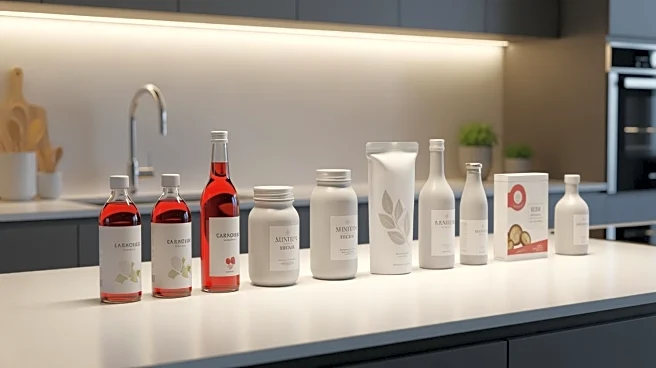What's Happening?
Private label brands are increasingly capturing market share in the food and beverage sector, challenging established companies like Mondelēz International. These brands are leveraging familiar branding
strategies to appeal to consumers, often mimicking the packaging and design of well-known products. Mondelēz International has responded by filing a lawsuit against Aldi, accusing the retailer of diluting the distinctive quality of its flagship brands such as Oreo, Wheat Thins, and Nutter Butter. The lawsuit highlights the growing tension between legacy brands and private labels, as the latter continue to gain cultural relevance and consumer acceptance.
Why It's Important?
The rise of private label brands signifies a shift in consumer preferences towards value and familiarity, challenging established companies to innovate and adapt. This trend could lead to increased competition and pressure on legacy brands to refresh their branding strategies and product offerings. As private labels become more prominent, they push category leaders to reconsider their market strategies and potentially embrace more flexible and experimental approaches to maintain their market position. The legal actions taken by companies like Mondelēz International underscore the competitive landscape and the need for established brands to protect their equity while evolving to meet new consumer demands.
What's Next?
Legacy brands may need to explore new branding strategies and product innovations to differentiate themselves from private label competitors. This could involve refreshing packaging designs, introducing new product lines, or leveraging marketing campaigns that emphasize unique brand attributes. The ongoing legal battles may also prompt discussions within the industry about intellectual property rights and the balance between competition and innovation. As private labels continue to grow, established companies will likely face increased pressure to adapt and innovate to retain consumer loyalty and market share.
Beyond the Headlines
The emergence of private label brands raises questions about the ethical implications of branding and consumer perception. As these brands mimic established products, they challenge the notion of originality and creativity in the industry. This development may lead to broader discussions about the role of branding in consumer decision-making and the potential impact on brand loyalty. Additionally, the legal disputes highlight the complexities of intellectual property rights in the context of branding and packaging, potentially influencing future industry standards and practices.








